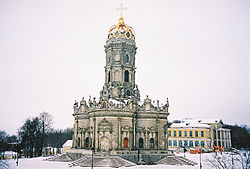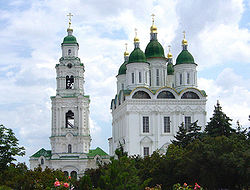
Boris Alexeyevich Galitzine
Encyclopedia


Galitzine
For Orthodox clergyman and theologian, see Alexander Golitzin.The Galitzines are one of the largest and noblest princely houses of Russia. Since the extinction of the Korecki family in the 17th century, the Golitsyns have claimed dynastic seniority in the House of Gediminas...
family. His chief political opponent was his own cousin Vasily Vasilyevich Galitzine
Vasily Vasilyevich Galitzine
Prince Vasily Vasilyevich was probably the greatest Russian statesman of the 17th century. He belonged to the Galitzine family and his main political opponent was his cousin Boris Alexeyevich Galitzine.-Life:...
.
Life
Boris was a court ChamberlainChamberlain (office)
A chamberlain is an officer in charge of managing a household. In many countries there are ceremonial posts associated with the household of the sovereign....
since 1676. He was the young tsar Peter's chief supporter when, in 1689, Peter resisted the usurpations of his elder sister Sophia
Sophia Alekseyevna
Sophia Alekseyevna was a regent of Russian Tsardom who allied herself with a singularly capable courtier and politician, Prince Vasily Galitzine, to install herself as a regent during the minority of her brothers, Peter the Great and Ivan V...
, and the head of the loyal council which assembled at the Trinity monastery
Troitse-Sergiyeva Lavra
The Trinity Lavra of St. Sergius is the most important Russian monastery and the spiritual centre of the Russian Orthodox Church. The monastery is situated in the town of Sergiyev Posad, about 70 km to the north-east from Moscow by the road leading to Yaroslavl, and currently is home to...
during the crisis of the struggle. It was Galitzine who suggested taking refuge in that strong fortress and won over the boyars of the opposite party.
In 1690 he was created a boyar
Boyar
A boyar, or bolyar , was a member of the highest rank of the feudal Moscovian, Kievan Rus'ian, Bulgarian, Wallachian, and Moldavian aristocracies, second only to the ruling princes , from the 10th century through the 17th century....
and shared with Lev Naryshkin
Naryshkin
Naryshkin is a Russian surname and may refer to:* Members of the Naryshkin family* Sergey Naryshkin , a politician* Two men of the name Kirill Naryshkin...
, Peter's uncle, the conduct of home affairs. After the death of the tsaritsa Natalia, Peter's mother, in 1694, his influence increased still further. He accompanied Peter to the White Sea
White Sea
The White Sea is a southern inlet of the Barents Sea located on the northwest coast of Russia. It is surrounded by Karelia to the west, the Kola Peninsula to the north, and the Kanin Peninsula to the northeast. The whole of the White Sea is under Russian sovereignty and considered to be part of...
(1694–1695); took part in the Azov campaign
Azov campaigns
Azov campaigns of 1695–96 , two Russian military campaigns during the Russo-Turkish War of 1686–1700, led by Peter the Great and aimed at capturing the Turkish fortress of Azov , which had been blocking Russia's access to the Azov Sea and the Black Sea...
(1695); and was one of the triumvirat who ruled Russia during Peters first foreign tour (1697–1698). The Astrakhan rebellion (1706), which affected all the districts under his government, shook Peter's confidence in him, and seriously impaired his position. In 1707 he was superseded in the Volgan provinces by Andrei Matveev. A year before his death he entered a monastery.
Galitzine was a typical representative of Russian society of the end of the 17th century leaning towards Westernism
Western world
The Western world, also known as the West and the Occident , is a term referring to the countries of Western Europe , the countries of the Americas, as well all countries of Northern and Central Europe, Australia and New Zealand...
. In many respects he was far in advance of his age. He was highly educated, spoke Latin
Latin
Latin is an Italic language originally spoken in Latium and Ancient Rome. It, along with most European languages, is a descendant of the ancient Proto-Indo-European language. Although it is considered a dead language, a number of scholars and members of the Christian clergy speak it fluently, and...
with graceful fluency, frequented the society of scholars and had his children carefully educated according to the best European models. Yet this eminent, this superior personage was an habitual drunkard, an uncouth savage who intruded upon the hospitality of wealthy foreigners, and was not ashamed to seize upon any dish he took a fancy to, and send it home to his wife. It was his reckless drunkenness which ultimately ruined him in the estimation of Peter the Great, despite his previous inestimable services.

